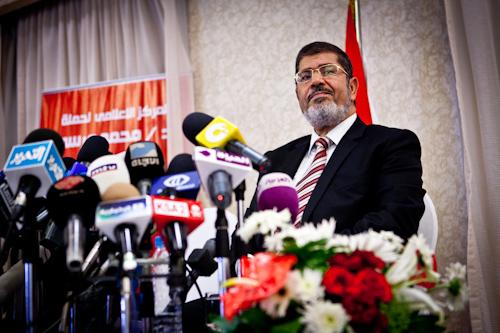 The Egyptian Center for Human Rights has requested that the attorney general investigate statements of Mohamed Morsy and other leaders of the Freedom and Justice Party and the Muslim Brotherhood that accused the Copts of betraying the revolution by voting for Ahmed Shafiq.
The Egyptian Center for Human Rights has requested that the attorney general investigate statements of Mohamed Morsy and other leaders of the Freedom and Justice Party and the Muslim Brotherhood that accused the Copts of betraying the revolution by voting for Ahmed Shafiq.
Before the election, the church had announced that it was impartial toward all presidential candidates.
The center considers Morsy's statement an irresponsible act that fuels sectarianism in society, saying that Coptic votes were distributed among Shafiq, Amr Moussa, Hamdeen Sabbahi and Abdel Moneim Abouel Fotouh, despite their different orientations.
In a statement on Tuesday, the center accused the Brotherhood of exploiting religion as a cover to advance its personal interests without regard for the interests of the people, by dividing the country into Muslims and Copts.
The center also rejected the statements of the party’s secretary general in Minya, who said that Copts who voted for Shafiq should not be considered Egyptians.
It referred to the Constitutional Declaration, which grants the right to all citizens to freely elect whomever they believe would achieve their aspirations, without the interests of a single political party being imposed.
Some Islamists alleged that most Copts, who make up around 10 percent of the country’s population of about 82 million, voted strongly for Shafiq, a former air force commander and former President Hosni Mubarak’s last prime minster.
It is noteworthy that the largest portion of votes won by Shafiq came from the Nile Delta region, which does not contain a large Christian population.
As for other provinces where Coptic populations are concentrated, such as Cairo and Alexandria, the polls were led by Sabbahi, while Morsy finished first in Minya and Sohag.
Commentators say that it is a mistake to consider Copts as a politically unified electorate, and argue that Christians, like the rest of Egyptians, hold different political orientations varying according to social, economic and intellectual factors.
Copts are the largest religious minority in the Middle East. They say that they face discrimination in many aspects of life, facing restrictions in getting senior bureaucratic posts and also in constructing or even repairing places of worship.



